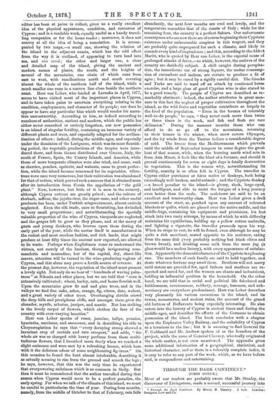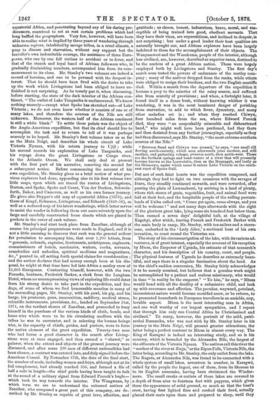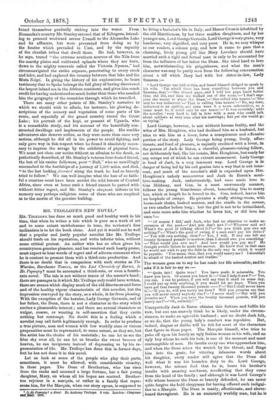THROUGH THE DARK CONTINENT.*
(FIRST NOTICE.] MOST of our readers are probably aware that Mr. Stanley, the discoverer of Livingstone, made a second, successful journey into • Through the Dark Continent. By Henry AL Stanley. 2 Tole. LondOn Sampson Low and Co.
equatorial Africa, and penetrating beyond any of his daring pre- decessors, contrived to set at rest certain problems which had long baffled the geographers. Very few, however, will have been able to realise what is implied by three years of wandering through unknown regions, inhabited by savage tribes, in a cruel climate, a prey to disease and starvation, without any support but the traveller's own indomitable courage, the assistance of three Euro- peans, who one by one fell victims to accident or to fever, and that of the stanch and loyal band of African followers who, in gradually diminishing numbers, accompanied him from its com- mencement to its close. Mr. Stanley's two volumes are indeed a record of heroism, and one to be perused with the deepest in- terest. That he should have been fired with the desire to take up the work which Livingstone had been obliged to leave un- finished is not surprising. As he tersely put it, when discussing, before starting, the state of the dark interior of the African con- tinent, " The outlet of Lake Tanganika is undiscovered. We know nothing scarcely—except what Speke has sketched out—of Lake Victoria ; we do not even know whether it consists of one or of many lakes, and therefore the sources of the Nile are still unknown. Moreover, the western half of the African continent is still a white blank." To settle these points was the object of the Anglo-American expedition, but that its chief should live to accomplish the task and to return to tell of it was perhaps scarcely to be hoped. Mr. Stanley's first volume takes us as far as the Muta Nzige, and describes his whole circuit of Lake Victoria Nyanza, with his return journey to Ujiji ; while his second records his exploration of Lake Tanganika, and his voyage down the great Livingstone or Congo river, to the Atlantic Ocean. We shall only deal at present with the first part of his narrative, reserving the second for a subsequent notice. Before commencing the account of his own expedition, Mr. Stanley gives us a brief review of what pre- vious explorers had done, appending also to his first volume two little maps, upon which are traced the routes of Livingstone, Burton, and Speke, Speke and Grant, Von der Decken, Schwein- furth, Baker, and Cameron, as well as his own former journey. He gives also Dapper's old map of equatorial Africa (1676), and those of Krapf, Rebmann, Livingstone, and Erhardt (1849-56), as well as a reduced map of his latest wanderings, which latter serves to assist the reader in following them out more minutely upon the large and carefully constructed loose sheets which are placed in pockets in the cover of each volume.
Mr. Stanley's real start took place from Zanzibar, although of course his principal preparations were made in England, and it is not a little amusing to discover that such was the general ardour for permission to accompany him, that over 1,200 letters, from "generals, colonels, captains, lieutenants, midshipmen, engineers, commissioners of hotels, mechanics, waiters, cooks, servants, somebodies and nobodies, spiritual mediums and magnetisers, &c.," poured in, all setting forth special claims for consideration ; and the author declares that had money enough been at his dis- posal, he might at that time have led into Africa a motley crew of 15,005 Europeans. Contenting himself, however, with the two Pococks, boatmen, Frederick Barker, a clerk from the Langham Hotel, whom no uncompromising views of exploring life could deter from his strong desire to take part in the expedition, and five dogs, of some of whom we find honourable mention in many of the succeeding pages, Mr. Stanley, with his yawl, his gig, and his barge, his pontoons, guns, ammunition, saddlery, medical stores, scientific instruments, provisions, &c., landed on September 21st, 1874, on the verdant shores of Zanzibar, and proceeded to busy himself in the purchase of the various kinds of cloth, beads, and brass wire which were to be his circulating medium with the tribes he was to encounter, and in selecting the human beings who, in the capacity of chiefs, guides, and porters, were to form the native element of the great expedition. Twenty-two men who had borne a good character in the search after Living- stone were at once engaged, and then ensued a " shawri," or palaver, when the extent and objects of the present journey were discussed, and after some 230 men of different nationalities had been chosen, a contract was entered into, and duly signed before the American Consul. By November 17th, the date of the final start, the number of souls, including women and boys, although not at its full complement, had already reached 356, and formed a file of half a mile in length—the chief guide having been taught to halt at the sound of a military signal from Edward Pocock's bugle— which took its way towards the interior. The Wangwana, by which term we are to understand the coloured natives of Zanzibar, who composed a great part of this company, are de- scribed by Mr. Stanley as capable of great love, affection, and gratitude ; as clever, honest, industrious, brave, moral, and sus- ceptible of being trained into good, obedient servants. That they have their vices, are superstitious, and inclined to despair, is not surprising ; but under a good leader their best qualities are
naturally brought out, and African explorers have been largely indebted to them for the accomplishment of their objects. The Wanyamwezi and the Wasukuma, people of the interior, although less civilised, are, however, described as superior races, destined to be the nucleus of a great African nation. These were largely employed both by Livingstone and Stanley. The first day's march soon tested the powers of endurance of the motley com- pany ; many of the natives dropped from the ranks, while others were obliged to resign their burdens, and the two English mastiffs died. Within a month from the departure of the expedition it became a prey to the miseries of the rainy season, and Buffeted also from scarcity of provisions ; and when, a fortnight later, it found itself in a dense bush, without knowing whither it was wandering, it was in the most imminent danger of perishing from starvation, to add to which fever, dysentery, and many
other maladies set in ; and when they reached Chiwyu, four hundred miles from the sea, where Edward Pocock died, they were " an unspeakably miserable and disheartened band," who might well have been pardoned, had they there and then desisted from any further journeyings, especially as they had then discovered, says Mr. Stanley, " the most extreme southern sources of the Nile."
"Between Sund and Chiwya was crossed," ho says, " one small rill flowing north-easterly, which soon afterwards joins another, and still another, and gathering volume, swerves north, then north-west. These are the furthest springs and head-waters of a river that will presently become known as the Leewuinbu, then as the Monangah, and lastly as the Shimeeyu, under which name it enters Lake Victoria on the south- east coast of Spoke Gulf.
But not of such faint hearts was the expedition composed, and although they had to fight on two occasions with the savages of Ituru, they steadily continued onwards, and were rewarded, after passing the plain of Luwamberri, by arriving in a land of plenty, where rich stores of grain, vegetables, fruit, and animal food were laid at their feet, and the hospitable people of the rolling pasture- lands of Usiha called out, " Come yet again, come always, and you will be welcome ! " and not many days afterwards with the sight of the glorious great lake, lying some six hundred feet below them. Then ensued a seven days' delightful halt, at the village of Kagehyi, after which, leaving Pocock and Frederick Barker with the main body in camp, Mr. Stanley, with ten sailors and a steers- man, embarked in the ' Lady Alice,' a sectional boat of his own invention, to coast round the Victorian sea.
The story of his circumnavigation of the lake, with its various ad- ventures, is of great interest, especially the account of his reception by Mtesa, the Emperor of Uganda, his estimate of that monarch's character, and his description of his country, court, and people.
The physical features of Uganda he describes as extremely beau- tiful, and says there is a singular fascination about the land. As
to the chief's sudden conversion, Mr. Stanley fairly acknowledges it to be merely nominal, but believes that a genuine work might be accomplished by a patient and zealous missionary, who would in time " in reality be the emperor." " To him," he says, " Mtesa would bend with all the docility of a submissive child, and look up with reverence and affection. The peculiar, wayward, petulant, inconsistent nature would become moulded anew, or be reborn, to be presented henceforth to European travellers in an amiable, nay, lovable aspect. Mtesa is the most interesting man in Africa, and one well worthy of our largest sympathies, and I repeat that through him only can Central Africa be Christianised and civilised." To many, however, the portrait of the mild, patri- archal Rumanika, who was met with by Mr. Stanley later in his journey to the Muta Nzige, will present greater attractions, the latter being a perfect contrast to Mtesa in almost every way. The King of Karagwe is indeed an interesting study, and so is his country, which is bounded by the Alexandra Nile, the largest of the affluents of the Victoria Nyanza. The natives call this river the " mother of the river at Zinja," or the Ripon Falls, Victoria Nile, the latter being, according to Mr. Stanley, the only outlet from the lake. The Kagera, or Alexandra Nile, was found to be connected with a whole system of small lakes, seventeen in number, in Karagw6, called by the people the Ingezi, one of these, from its likeness to to its English namesake, having been christened the Winder- mere. The small creeks or outlets of these lakes are covered to a depth of from nine to fourteen feet with papyrus, which gives them the appearance of solid ground, so much so that the boat's crew, having first lighted fires and cooked their food, actually placed their mats upon them and prepared to sleep, until they
found themselves gradually sinking into the water. From Rumanika's country Mr. Stanley entered that of Kibogora, intend- ing to proceed westward across Urundi to the Alexandra Lake and its affluents, but were prevented from doing so by the famine which prevailed in LTsui, and by the rapacity of the churlish tribes that dwell there. He had, however, as he says, traced "the extreme southern sources of the Nile from the marshy plains and cultivated uplands where they are born, down to the mighty reservoir called the Victoria Nyanza," had circumnavigated the entire expanse, penetrating to every creek and inlet, and had explored the country between that lake and the Muta Nzige. In giving the history of his explorations, he bears testimony that to Speke belongs the full glory of having discovered the largest inland sea in the African continent, and gives him much credit for having understood so much better than those who assailed him the geography of the countries through which he travelled.
There are many other points of Mr. Stanley's narrative to which we should wish to allude, for instance, his glowing de- scriptions of the scenery and vegetation of some parts of his route, and especially of the grand country round the Great Lake ; his portrait of the kopi, or peasant of Uganda, who is a remarkable study, and his account of the beautifully con- structed dwellings and implements of the people. His warlike adventures also deserve notice, as they were more than once very serious, although he did all in his power to avoid fighting, and only gave way in this respect when he found it absolutely neces- sary to impress the savage by the exhibition of physical force. We must not close our notice without an allusion to the death, so pathetically described, of Mr. Stanley's veteran four-footed friend, the last of his canine followers, poor "Bull," who so unwillingly succumbed to the hardships of a journey of 1,500 miles, and died, "to the last looking forward along the track he had so bravely tried to follow." We can well imagine what the loss of so faith- ful a creature must have been amidst the wild forests of Central Africa, since even at home such a friend cannot be parted with without bitter regret, and Mr. Stanley's eloquent tribute to his memory may perhaps enlighten some of those who are sceptical as to the merits of the genuine bulldog.




































 Previous page
Previous page